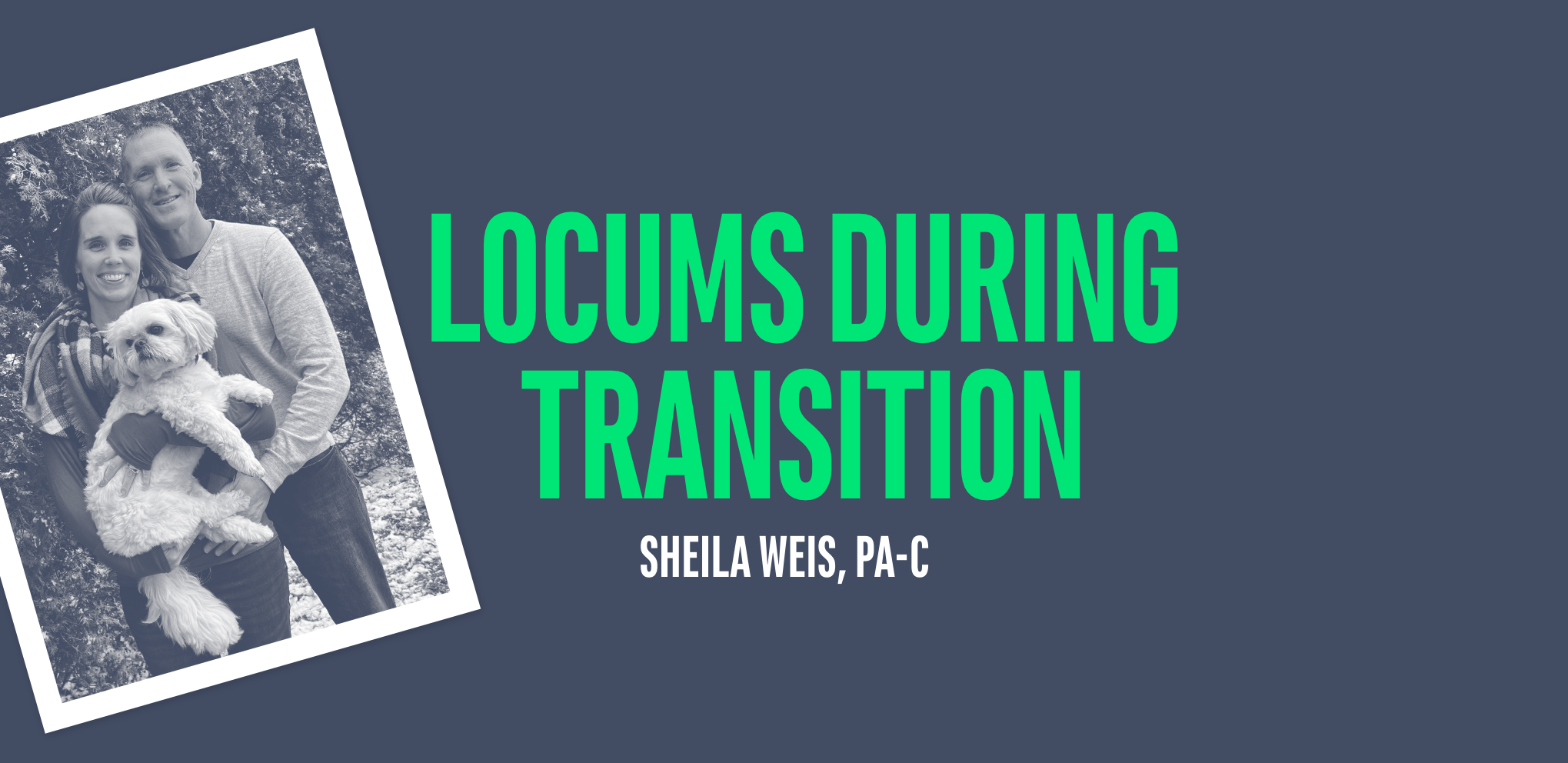In times of change and uncertainty, locums can serve as a bridge to get you through the transition––whether you’re looking for work in a new city, or using it as a temporary stopgap between jobs.
Physician Associate Sheila Weis is a great example. She didn’t know anything about locum tenens before her husband’s teaching job took them to a new location. She decided to explore locums to tide her over until she could find the right full-time position––and when she found one sooner than she thought, she was able to adjust her locums assignment to accommodate it.
We sat down with Sheila to talk more about how locum tenens helped get her through the transition. Here’s what she had to say:
What led you to become a Physician Assistant?
Medicine was just the only option for me. Even in grade school. I remember sitting in a parent teacher conference––we had these little assignment notebooks, and on the front page you had to write what career you wanted, and I wrote that I wanted to be a nurse. And my teacher was like, why not a doctor? So that opened the gates.
I got into sports in middle school and wanted to go into athletic training. And then I spent the first semester of my senior year in mentorship with orthopedic surgeons, PAs, exercise physiologists, and physical therapists.
But there was never a question that I would go into anything outside of medicine. I never thought of anything else.
What made you decide to try locums, and what did that process look like for you?
It was a quick process. I had no plans to switch jobs, but my husband is a teacher and his school district was going through a bunch of financial troubles.he decided that he was going to look for a different job so that he could leave on his terms. As soon as he started applying, I started putting my LinkedIn profile together and updating my resume, knowing that if he found the right fit, we were going to move. That’s when I got contacted by Miller [Harris, Weis’s consultant].
I’ve only had one job out of PA school, and I found that through my clinicals, so I haven’t had to go through the whole job application process before. It was all new and it went very, very quickly.
My initial assignment was supposed to be full-time for four months. But when I found a full-time position quicker than I thought, I was able to get it switched to part-time.
What are some of the key differences between your two roles as a locums PA and a hospital PA?
On the locums side, you just constantly work with different people. So you’re coming in trying to do the best that you can to work within their system, but at the same time, they know that it’s short term, so they only expect so much out of you. They don’t expect you to necessarily know their systems, their ins and outs, and their quirks.
In my full-time position, I’m going to be working with these docs every day, and they each have their own little quirks: they like orders done in certain ways, and they talk to their patients in certain ways, and they want you to be able to mimic that.
We read recently that the title of Physician Assistant will be changing to Physician Associate. How do you feel about that change?
I think most PAs will say that it’s a positive change. When you peg the word assistant onto physician, people think we can’t function without them, that we can only do what they tell us to do. And that’s not the case at all.
We can work independently. We can diagnose, we can treat, we can write prescriptions, we can order tests, we can translate what those mean and put them into a plan. The title of Physician Associate communicates that we work with physicians, that we’re a team.
Has that change started to go into effect yet?
I think PAs are the only people that know that it actually changed. [laughs] But it’s an education thing. When the news of the change first came out, we were told that it would be a three year process: first they had to get the title changed, and now they’re trying to figure out the best way to present it so that everyone knows. That’s taking time, but they want to do it the right way so that people understand.
What advice would you give to other PAs considering locums?
You know, when I went through school seven or eight years ago, they never talked about locums. They never told us it was an option. Then we went through a crisis in the healthcare field and people left, and now we’re in a shortage, and now locums has become a very common thing.
Miller, my consultant, was the one who brought up the idea of locums to me. Prior to that, I would have never considered it, so he educated me about it. A big part of how I got into locums and why the transition went well was all because of Miller.
I had five or six other recruiters that contacted me, and the experience was less than par. The way Miller went about it, his consistent communication and reaching out, made everything go smoothly. He called me instead of just emailing me, and it never sounded like he was reading from a piece of paper. And then once he did find a good fit, he just walked me through the whole process. Every single time I had a question, he answered it the same day. He just took care of everything.
So that’s the advice I would give: you have to find the right middleman, who is a good fit for you.
*This interview has been edited for clarity and length.



